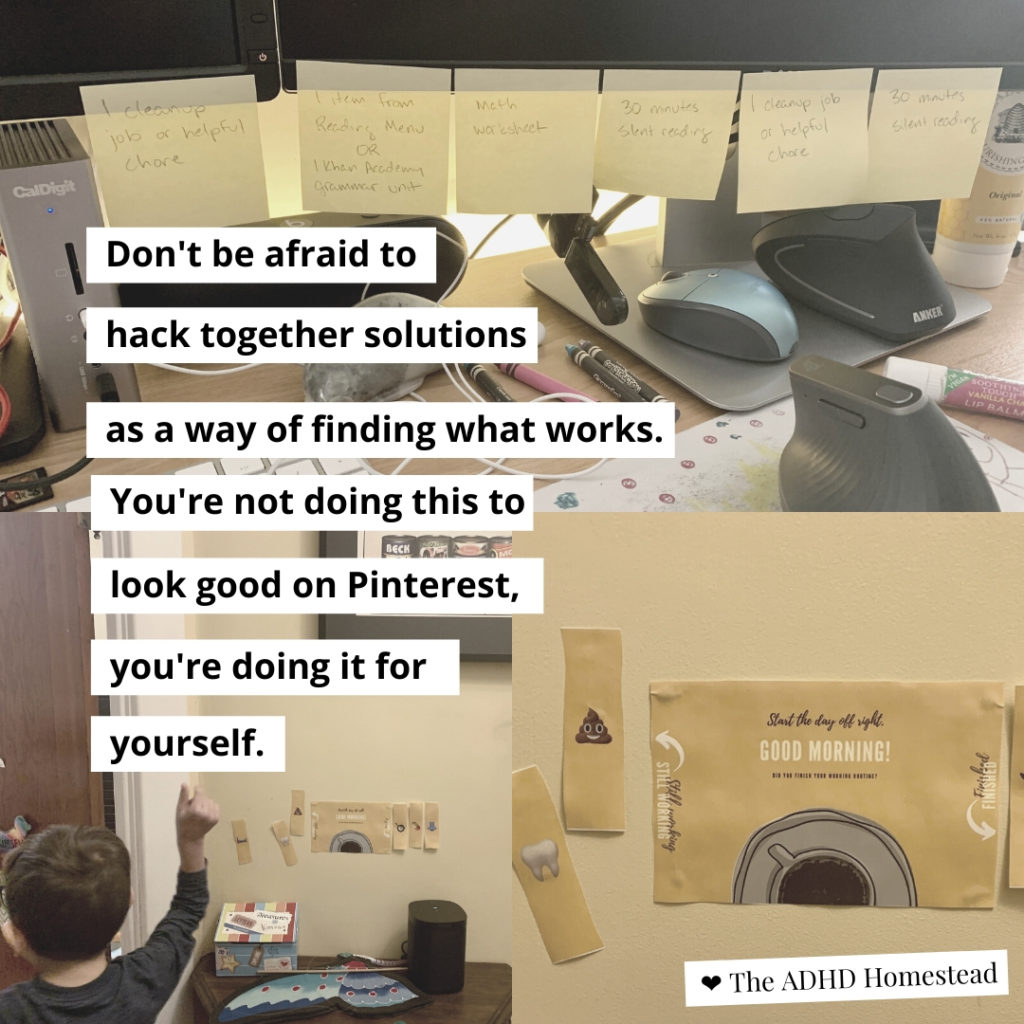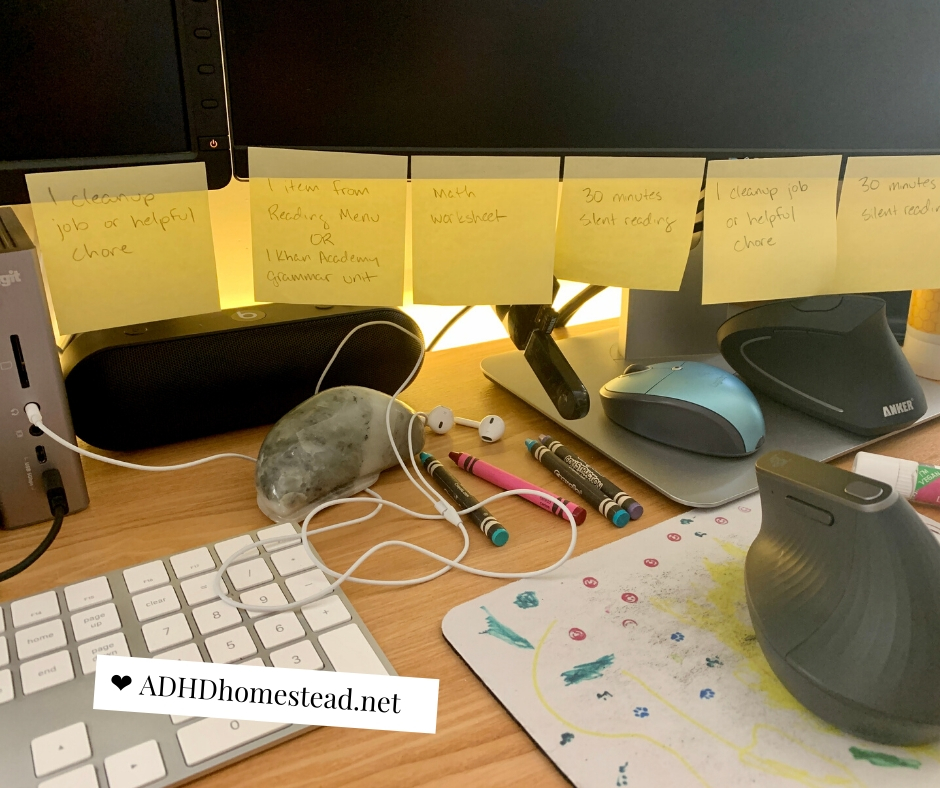Use the player above to listen to the text of this post. To receive expanded versions of new audio posts and other bonus content in your favorite podcast app, become a supporter of The ADHD Homestead on Patreon.
They popped up as soon as schools closed for the coronavirus pandemic: advice posts. Suddenly everyone had pro tips for weathering a pandemic lockdown as a working parent with kids at home.
It rubbed me the wrong way, and at first I wasn’t sure why. With everyone asking, “what do we do now?” shouldn’t we welcome any advice we can get?
The more I thought about it, the more I thought no, we shouldn’t. No one needed advice right then. We may not even need it now. That’s not to say we’re all rocking this. I don’t think anyone is, regardless of what they post to the contrary on Instagram. Most of us simply aren’t in the position to take in any advice right now, which makes most advice a waste of time.
Our rational brains check out when we’re under too much stress

As I pondered what about all this helpful advice-giving bothered me so much, I thought about people who train for high-stress situations. I thought about how the State of Pennsylvania required me to log 50 hours behind the wheel with someone else before I could take their driver’s license test. A lot of training focuses not so much on thinking, but on instinct.
In moments of danger or distress, the rational, evolved part of our brains actually shuts down. We default to our primitive, reactive brain. Autopilot and instinct replace restraint and forethought.
Not too long ago I was talking to my dad about driving tractor trailers. He’s been driving trucks for a living at least as long as I’ve been alive, but this was one of the first times he spoke frankly about how dangerous trucking is. It requires a much better innate understanding of physics than most of us give it credit for. Over time, that understanding gets folded into your basic instincts. Experienced truckers also develop a knack for predicting car drivers’ behavior and keeping out of danger. “It takes years of experience to get really good at it,” my dad told me, “and you just have to hope you don’t die getting your experience.”
In other words, we fall back on our instincts whenever we need them. We don’t have the option to freeze time so we can stop and think. Either we know what to do and we do it, or we don’t and we do something else.
For people with ADHD, “too much stress” can be the norm
The early years of my independent adulthood were, in many ways, a non-stop stress-fest. Unmanaged ADHD didn’t afford me down time, when I felt okay and life ran along smoothly. Quite the contrary. My journals from that time talk about a “constant baseline” of anxiety and dread, a hum in the background of every waking moment.
Over time, I learned to keep the chaos at bay. I tackled issues one at a time, little by little. I celebrated even the smallest victories.
When we’re in full chaos mode, we’re too overwhelmed to take on anything difficult — and that includes figuring out how to craft our ideal life from the ground up. In these situations we need to pick just one small thing — really, the smallest thing — and make whatever progress we can. Then we build on that progress until we start to get some real momentum.
When this latest crisis hit, I ignored all the advice and did the bare minimum
The beginning of a pandemic is hardly the time to adopt some fancy new organizational system or learn to homeschool your children. I knew this instinctively because my life has been upended before. I’ve been at a total loss before. For better or worse, my instincts for dealing with adversity have gotten pretty good.
So I didn’t bother to make a daily schedule my family would never follow anyway. I did exactly zero Google searches and added to exactly zero Pinterest boards on enrichment activities for my kid.
What I did do was continue my routines as usual — especially on work and school days — unless forced to do otherwise. I maintained the same expectations I always have of my household for weekday behavior:
- Out of bed at 6:30
- Put on real clothes
- Be ready for work and school by 7:30
- No recreational screen time — for us, mostly video games — before 3:00 in the afternoon
The only big change was our location. Our routine had served us well thus far. Why change it now?
I’ve had to make a few adjustments
That’s not to say nothing has changed. Plenty has changed, and I’ve implemented a few new systems since stay at home orders began. I’ll share two examples:
Our school district didn’t set up distance learning until our third week at home. In the interim, I struggled to set consistent expectations for my kiddo during the work/school day. I didn’t want him playing video games or watching TV all day, but I also didn’t want him interrupting me every five minutes. I gave him a few independent activity ideas: read a book, do a math worksheet from school, help me out in the office, or do some coding challenges on the computer.
Problem was, I couldn’t keep track of what he’d done and what I should suggest he do next. This is ADHD’s working memory weakness at play: many of our brains simply can’t wrap around a list of six choices. To fix this, I externalized it with a sticky note for each activity. The sticky notes hung from one of my computer monitors and he could pull them off and set them aside as he completed them.

The same happened with his morning routine. The routine hasn’t changed during the pandemic, yet somehow it still became a challenge for me. Knowing my brain wasn’t about to change anytime soon, I made an uncharacteristically cutesy morning routine tracker. It hangs on the wall and works like the sticky notes. There’s one emoji “ticket” for each step of the kiddo’s morning routine. The tickets start on the left side of the tracker and he moves them to the right as he finishes them.
![]()
Since the first day I implemented this, mornings have gone much more smoothly. I haven’t had to chase after him to do anything, and he’s gotten off track far fewer times. It makes me wonder if I should’ve done it sooner!
Note that neither of these solutions is particularly fancy: the first employed only a pencil and six sticky notes and never evolved beyond that. The second looks a little slicker because I used a Canva template for the center piece. However, I still made it in a very short time and hung it on the wall with blue poster putty, a la my high school and college decorating style.
Don’t be alarmed if the most mundane activities are suddenly difficult
This working memory stuff can be frustrating and kind of unsettling. I’m still shocked at how bad it can get under the right circumstances. The other night I got overwhelmed after ordering takeout because there were too many containers (perhaps five or six) and I couldn’t figure out how to arrange them on the table. It can be funny, but it’s no joke.
Disruptive times like the one we’re in right now can put our ADHD symptoms into overdrive. I like to remember that under enough stress, even the most naturally organized person will start exhibiting ADHD-like symptoms. The fact that my ADHD feels supercharged right now isn’t cause for alarm. I shouldn’t beat myself up about it. It just is what it is, and I have to work around it — like I always do.
You won’t find many proactive solutions in my house
You’ll notice the solutions I shared here have a few things in common:
- They’re a response to immediate needs
- They focus on what I need to succeed in my role in our household, not faults I’ve found with others
- They don’t impose anything I think my kid or my family at large might benefit from or should do
In other words: they’re reactive, not proactive. I didn’t do any work or make any changes until the need arose.
It’s easy to see something on Pinterest or Instagram and wish our home life made us feel like that pretty picture does. It’s harder to pause and ask ourselves, “would that solve a problem we actually have, in a way that would work for our family?” I have no time or energy for fixing things that aren’t broken. If it works most of the time, I leave it alone — even if it’s ugly.
However, I’ve also had to face the reality of our current situation, which is (among other things) that it’s making my ADHD symptoms worse. I’m more distracted, more forgetful, more easily confused and overwhelmed. Maybe everyone else is, too. As a result, a few of our established systems broke down.
When a system breaks down, I’ve learned to view it objectively and get to the bottom of why the failure happened. I have no concrete evidence my kid was any more off-task with his morning routine than usual. However, my perception changed, and that became a problem. Maybe I’d been nudging him more than I realized and I suddenly lost my ability to keep a handle on all the steps. I don’t know. What I do know is I needed an external tool to relieve the pressure on my brain.
If it ain’t broke…
Maybe that’s what irked me about the immediate influx of helpful tips on how to deal with this pandemic. In a moment when everything felt new and different, how could anyone claim expertise? How could anyone presume to know what any given family needed? I didn’t even know how my own family’s needs would change.
Now I do — at least for today. Each week has been a little different, and we’ve adapted accordingly. We’ve relied on the same coping mechanisms we always have. Until I got my sea legs, though, I had no idea what the best path forward would look like. I’m convinced anyone who claimed otherwise was delusional, or at least putting up a front.
I may have written a book about putting your life in order, but I have no specific advice for dealing with this upheaval. I don’t want any advice, either. We’re all doing the best we can with the tools we have. This may include new tools we find necessary along the way, but now is not the time to make massive changes. Now is the time to go with your gut and hope for the best. I’m celebrating at least one very minuscule victory every day or so, and that’s more than enough for me.
Hey there! Are you enjoying The ADHD Homestead?
Here's the thing: I don't like ads. I don't want to sell your attention to an advertising service run by the world's biggest data mining company. I also value my integrity and my readers' trust above all, which means I accept very few sponsorships/partnerships.
So I'm asking for your support directly. For the cost of one cup of coffee, you can help keep this site unbiased and ad-free.
Below you will find two buttons. The first lets you join our crew of Patreon pals and pledge monthly support for my work. Patrons also have access to my Audioblogs podcast. The second takes you to a simple donation page to pledge one-time or recurring support for The ADHD Homestead, no frills, no strings. Do whichever feels best for you!
